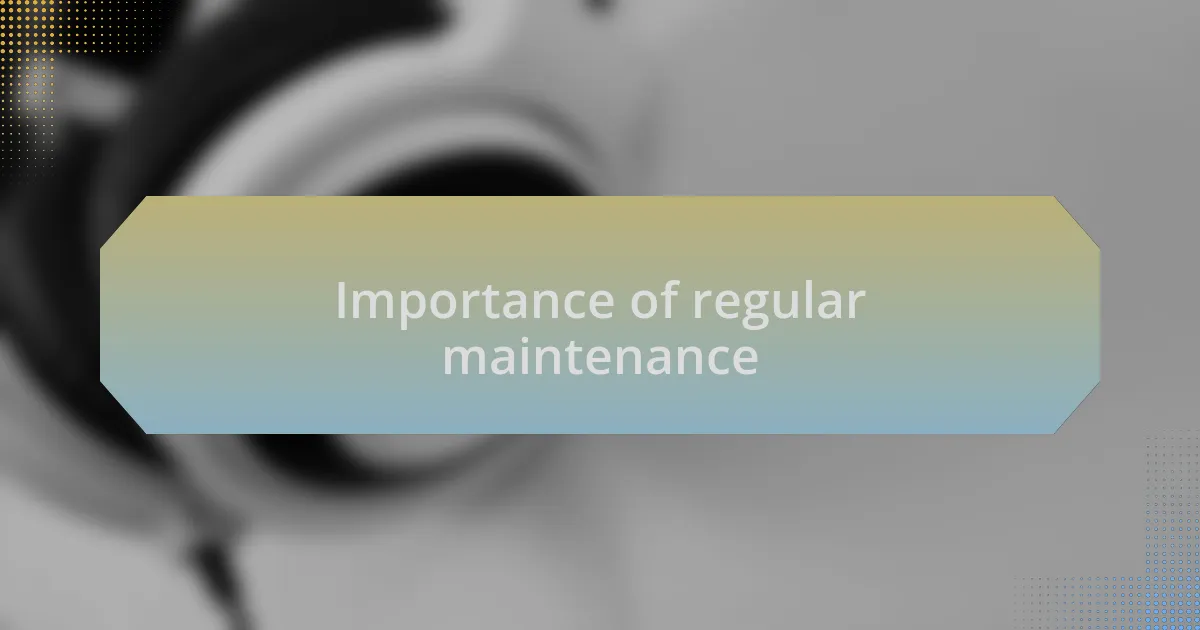Key takeaways:
- Insufficient storage space and outdated software are primary causes of slow laptop performance; regular updates and decluttering can enhance efficiency.
- Monitoring background applications and maintaining proper ventilation are crucial for preventing overheating and optimizing resource usage.
- Upgrading hardware, such as switching to an SSD, can significantly improve startup times and overall laptop responsiveness.
- Regular maintenance, including cleaning internal components and managing startup programs, is essential for maintaining laptop longevity and performance.

Understanding laptop performance issues
When I first noticed my laptop slowing down, it felt like watching a friend struggle to keep up in a race. Performance issues can stem from many factors, such as inadequate RAM or an overloaded hard drive. Have you ever had that sinking feeling when you realize your device isn’t performing as it should? It’s frustrating!
One time, I was deep into a project when my laptop decided to freeze. It turned out that many background applications were draining its resources. This experience taught me the importance of monitoring what runs in the background. Knowing what your laptop is doing behind the scenes can truly empower you as a user.
Another key aspect of performance issues is heat buildup. I remember when my laptop would become uncomfortably warm during simple tasks. This is a clear sign of poor ventilation or aging thermal paste. It’s essential to ensure that your device is well-ventilated, as overheating can significantly impact its longevity and efficiency. How often do we really consider the internal environment of our tech? It’s crucial!

Common causes of slow laptops
There are several common culprits behind a slow laptop, and one of the first I encountered was insufficient storage space. I can vividly recall the anxiety of seeing that dreaded “low disk space” warning pop up while I was trying to work on an important document. It was like driving with the brakes on; I couldn’t focus and was constantly worrying. When I finally decided to declutter my hard drive, it was like a breath of fresh air, and my laptop performed noticeably better.
Another major factor I’ve learned about is outdated software. I remember when I ignored those pesky update notifications, thinking they weren’t a big deal. Oh, how wrong I was! Eventually, I experienced frustrating lag times and compatibility issues. Keeping your operating system and applications updated isn’t just a formality; it’s essential for optimal performance and security. Have you ever delayed updates only to wish you hadn’t?
Let’s not forget about malware, either. I did have one alarming incident when my laptop slowed to a crawl, and I discovered it was infected with malicious software. The relief I felt after conducting a thorough scan and removing the threats was immense. It’s essential to have reliable antivirus software installed, as this can save you from significant slowdowns and protect your valuable work. How often do you think about the invisible dangers lurking in your digital world?

Importance of regular maintenance
Regular maintenance is vital for keeping your laptop running smoothly. I once neglected simple tasks, like cleaning the internal fans and dust filters, and found myself facing overheating issues that turned my device into a sluggish brick. After finally taking the time to open my laptop and give it some TLC, I was amazed at how much quieter and more responsive it felt. Have you ever thought about how much dust collects inside your device over time?
I can’t stress enough the importance of routinely checking for software updates. There was a time when I let months slip by without addressing system upgrades. I remember the nagging feeling that I should do it, only to procrastinate until my laptop started crashing mid-work. The moment I updated everything, I felt like I had unlocked a new level of performance. Isn’t it funny how often we overlook the simplest actions that could save us from headaches?
Additionally, keeping track of your storage and files plays a crucial role in maintaining performance. I once thought I could hold onto every file and download without consequences. When my laptop began to slow dramatically, it hit me like a ton of bricks that I needed to let go of unused files and applications. Freeing up space not only sped up my device but also made it easier to find the things I actually needed. Have you experienced that satisfying feeling of transforming clutter into clarity?

Steps to improve laptop performance
One of the simplest yet most effective steps to boost laptop performance is to manage your startup programs. I remember one particularly frustrating day when I was late for a meeting, and my laptop took an eternity to boot up because of all the applications loading automatically. Taking a few minutes to review and disable unnecessary startup items not only cut down my boot time significantly but also freed up system resources for when I needed them most. Have you ever thought about how many programs could be competing for your laptop’s attention right from the get-go?
In my experience, upgrading hardware components can breathe new life into a struggling laptop. When I decided to swap out my old hard drive for a solid-state drive (SSD), the transformation was remarkable. My laptop went from taking what felt like forever to start up and open applications to a lightning-fast machine that responded almost instantly. It made me wonder why I hadn’t made the switch sooner. Have you considered whether a simple hardware upgrade could change your daily workflow for the better?
Lastly, employing tools to monitor system performance has made a world of difference in my day-to-day. I recall a moment when I stumbled upon a performance management software that tracked CPU usage and memory consumption. It opened my eyes to how some applications could hog resources without me realizing it. This proactive approach allowed me to troubleshoot lagging issues before they turned into significant problems. It makes me curious: what insights could you gain if you took a closer look at what’s really happening under the hood of your device?

Personal experience with ASUS laptops
When I first started using an ASUS laptop, I was impressed with its sleek design and performance. It quickly became my go-to device for both work and play. However, I rapidly noticed that after a few months, it felt slower than I expected. I was initially frustrated, thinking I had made the wrong choice. Have you ever experienced that sinking feeling when a device doesn’t live up to your expectations?
Diving deeper into the performance issues, I began to explore the ASUS support community, which was surprisingly active. I discovered tips from other users who shared experiences similar to mine, highlighting how updating drivers can make a significant difference. I remember downloading the latest graphics drivers, and it felt as if I had breathed new life into my laptop. Have you ever taken that step and felt the immediate impact of a simple update?
One memorable moment was when I decided to check the ASUS pre-installed software for optimization features. I found a utility that cleared temporary files and optimized system settings. After running it, my laptop’s performance improved noticeably, and I felt relieved and re-energized. Isn’t it fascinating how sometimes the solution is right at your fingertips, just waiting for you to discover it?

Tips for ASUS laptop optimization
When it comes to optimizing your ASUS laptop, I found that managing startup programs can lead to significant performance improvements. One day, I noticed my laptop took ages to boot up, leaving me tapping my fingers in frustration. By disabling unnecessary startup applications, I could slash boot time dramatically, getting me back to work without the wait. Have you ever considered how many programs launch automatically every time you start your device?
Another impactful tip I discovered was the importance of regular maintenance checks on my hard drive. I remember running a disk cleanup after a particularly sluggish week and was shocked at how many files I had accumulated. This simple action cleared out unnecessary clutter, freeing up space and improving speed. It’s like decluttering your home; when there’s less junk around, everything runs smoother. How often do you think about that hidden digital mess on your laptop?
Lastly, I can’t stress enough the benefit of monitoring system temperatures, especially when gaming or running demanding applications. I once experienced a major slowdown because my laptop was overheating—something I hadn’t anticipated. By keeping an eye on temperature using ASUS tools, I learned when to take a break and let it cool down. Isn’t it curious how a little awareness can prevent bigger problems down the line?

Long-term solutions for performance issues
To ensure long-term stability and performance, I found that upgrading hardware components can make a world of difference. For instance, when my ASUS laptop started showing its age, I replaced the HDD with a solid-state drive (SSD). The transformation was incredible; boot times plummeted, and applications loaded almost instantaneously. Have you ever experienced that exhilarating moment when your device becomes faster than ever?
Another strategy I explored is investing in a cooling pad. I used to overlook how overheating could affect my laptop’s performance, but after a few marathon gaming sessions, I noticed serious lag. Adding a cooling pad not only helped regulate the temperature but also extended the lifespan of my device. Have you ever wondered if your laptop is working as hard as it should, or if simple tweaks could make it happier and healthier?
Finally, adopting an organized approach to software updates is crucial for long-term performance. I remember ignoring system updates for far too long, thinking they were just minor fixes. But once I started prioritizing those updates, I was amazed at the performance boosts and security enhancements that came with them. How often do you check for updates, and do you realize the potential benefits they bring to your ASUS laptop?